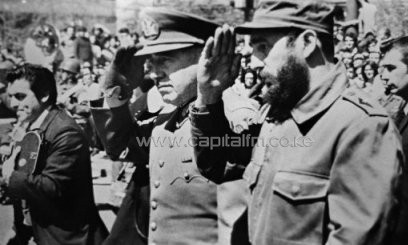
Picture dated 1971 showing General Augusto Pinochet (L), then Chile’s army chief, saluting with Cuban leader Fidel Castro/AFP
SANTIAGO, Región Metropolitana de Santiago September 8- Forty years after the coup that toppled Salvador Allende and brought the dictator Augusto Pinochet to power, Chile remains a country ill at ease with itself.
Life is very good by Latin American standards. The roads are spiffy and shopping centers are shiny, things work and poverty is greatly reduced.
But people question the neo liberal economic model that brought all that about and was instituted by Pinochet, with help from American economists.
And there is a widespread clamor to know more about the many thousands of people who went missing as Pinochet waged a war on anything that smacked of dissent.
Indeed, there is healing still to be done.
September 11 is the anniversary of the day in 1973 when air force planes bombed the presidential palace. Allende, an elected socialist, committed suicide rather than be captured.
These days, people are staging social protests calling for changes to the Pinochet legacy.
The general got the economy moving at the cost of privatizing education, health care and pensions, and opening up the economy to massive foreign investment.
“Today we are looking at another country. A country that decided to go out and march to defend its demands with a great degree of conscience and a clear idea that we have to change everything we inherited from the dictatorship. That makes us look at the 40 years in a totally different way,” said Lorena Pizarro, president of an association of relatives of people arrested or who went missing during Pinochet’s rule.
For sociologist Alberto Mayol, “with this commemoration, we are at the end of a political cycle that was born with the dictatorship, continued in the transition and which today is ending.”
Students have led the charge. They have staged protests against the Pinochet era education system.
People want to reform a neo liberal economic system that has Chile on the verge of being a wealthy developed country, but with much inequality and a political system that is not very representative.
The governments that have ruled in the transition since Pinochet left power in 1990 have managed to reduce the poverty rate from 40 percent to 14 percent. But social disparities persist.
Francisco Klapp, a researcher at the right-leaning institute Freedom and Development, said people do not so much want to go back to how Chile was pre-1970 but rather to be more a part of the current model.
With presidential elections two months away, the future of the economic model is at stake.
Former socialist president Michelle Bachelet, the favorite, has pledged broad political reform to do away with the vestiges of the Pinochet era.
She promises a new constitution to replace the one Pinochet instituted in 1980. Her main rival, the conservative Evelyn Matthei, wants to maintain the status quo.
“I love that there are women in politics but let’s get things right. This is a campaign involving two completely different plans,” Bachelet said recently.
These two women were children at the same time, but the coup transformed their lives in wildly different ways.
Their fathers were generals in the air force and good friends. But while Alberto Bachelet was arrested the day of the coup for remaining loyal to Allende, and died months later after being tortured, Fernando Matthei was a member of the Pinochet military junta.
Michelle Bachelet and her mother were arrested, tortured and had to flee into exile. Evelyn Matthei became part of the dictator’s personal inner circle.
Besides demands for change, there is more and more pressure in Chile to unmask the whole truth about a dictatorship that left more than 3,200 dead and some 38,000 people tortured.
As the coup anniversary date nears, the Chilean media is looking again at the regime’s main crimes, and that has reopened wounds in a country that is far from reconciliation.
“As time has gone by, reconciliation and justice have become the antithesis of each other,” said Lorena Pizarro.
“In any other country. justice can lead to reconciliation. In Chile, reconciliation is synonymous with injustice and impunity.” she said.
Isabel Allende, a senator and daughter of the late president, said: “You cannot close cycles so long as the things that have not been said are not said. Forty years have gone by and many things are starting to come out.”
The Chilean court system has some 1,300 cases open involving crimes committed during the 17 years of the dictatorship.
Some 800 civilian agents and military personnel have been charged and convicted. Of them, around 70 are in jail, almost all in special military prisons.
Pinochet died in 2006 without ever having gone on trial.









































